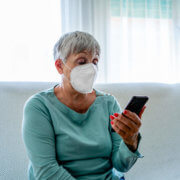Caregiver Self-Care Must-do’s during the holiday season in the time of Covid-19
Caregiving is stressful. Caregiving during the holiday season is even more stressful. Now throw a global pandemic into the mix, and caregivers will undoubtedly face new levels of stress never previously experienced.
November is National Caregivers Month, so we wanted to take a moment to acknowledge and celebrate the contributions of family caregivers, and provide support to caregivers, who are providing care during unprecedented times.
As news of successful vaccines provides a glimmer of light at the end of the tunnel, we also enter into the holiday season during a time of record-high numbers of Covid-19 cases. With so much going on in the world, it is easy for caregivers to forget about taking care of themselves, something that will have an adverse effect on many older adults in need of help.
Here are a few tips for self-care during the holidays, in the time of Covid-19:
- Accept help. Caregivers balance a lot in their day-to-day lives, and the holiday season is often a busy time of year with lots of items on the to-do list. Covid-19 has made everything more difficult, and this may also mean that help for caregivers may look different. Maybe a friend or family member can arrange to have groceries or prepared meals delivered to the caregiver or person being cared for. Have a family member or friend go for a socially distanced walk or have a socially distanced visit with the person being cared for to give the caregiver a break.
- Get connected. Caregivers often feel alone in their role, and the holidays can be an especially challenging time for them. Covid-19 is making everyone feel more lonely, with restrictions on gatherings and canceled activities. But as we adapt to the “new normal,” many caregiver support services have become virtual, including caregiver support groups and other community programming for caregivers. Check out this list from Care.com of virtual support groups. You may also want to contact your local Council on Aging or Area Agency on Aging to find out what virtual support programs are available in your community.
- Seek social support. Just as caregiver support programs have become virtual, so have most of our interactions with family and friends, who provide important emotional support to caregivers. The holidays are usually a time for gathering with extended family, but this year the CDC recommends celebrating virtually or only with people in your household. Although we cannot gather in person, caregivers can still take the opportunity while celebrating virtually to check in with extended family members and seek additional support if needed.
- Plan ahead. Now more than ever we see how uncertain the future can be. To help reduce some of the anxiety around caregiving during a pandemic, caregivers may want to consider planning ahead. What will happen if the caregiver gets sick? What will happen if the person you are caring for gets sick? What happens if other care providers, such as an adult day program or respite, become modified or unavailable? Put a plan together for any of these questions now so that you are prepared later.
- Celebrate the holidays a little differently. During normal times, caregiving during the holidays can be difficult because of the physical and/or cognitive limitations of the person receiving care. Maybe they are easily overstimulated or have a hard time getting around. This year, take the opportunity to celebrate the holidays in a new, and simpler, way, focusing on what is most meaningful to you. Although it might be sad to think about doing a Zoom Thanksgiving rather than an in-person celebration, Zoom holidays may be easier on the caregivers (less cooking, traveling, etc.) and on the person receiving care. Take advantage of some of the new holiday activities in your community, like drive-through light displays, or watching holiday concerts or movies on TV.
- Fill your tank. Caregivers are constantly giving themselves to others, especially during the holiday season. “All that giving can leave you running on empty,” cautions AARP. Find ways to “fill your tank,” like getting lots of sleep, exercising, and enjoying holiday traditions like decorating the house, baking, or listening to holiday music. Try to bring a little joy back into a time that has been full of anxiety and loss.
You are not alone!
We hope these tips have been helpful, and we want to remind you that you are not alone, even though it might feel like it sometimes. Many caregivers have a hard time asking for help and may end up feeling depressed and isolated. During this global pandemic, even those of us who are not caregivers are feeling this way, so it’s even more important for caregivers to seek support. The theme of this year’s National Family Caregivers Month is “caregiving around the clock,” acknowledging the reality that caregivers never truly get a break from caregiving. For additional caregiving resources, check out Mental Health America, the Caregiver Action Network, The Family Caregiver Alliance, AARP, and the National Institute on Aging.
Don’t forget to follow Assured Allies on Medium, Facebook, Twitter, and LinkedIn!







 Shuuterstock
Shuuterstock